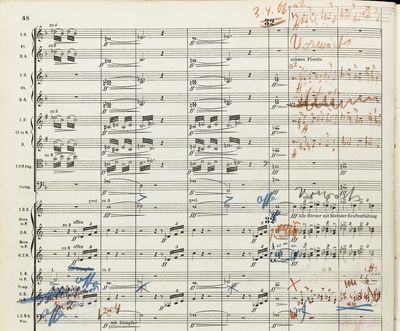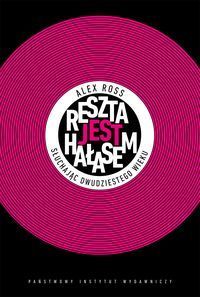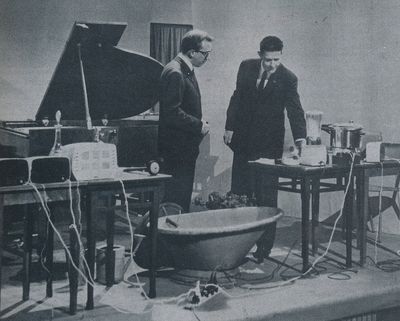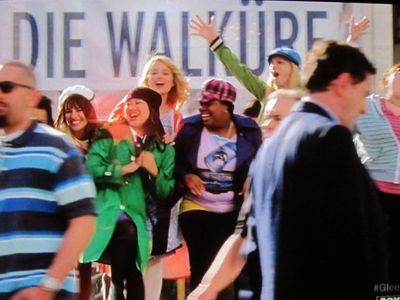Alex Ross's Blog, page 231
May 30, 2011
Noise in Poland
Alek Laskowski, who translated The Rest Is Noise into Polish, sends word that his work will be published on June 15 by PIW.
Nietzsche prophesies Sinatra, Beatles, Bieber
"Formerly, one wished to acquire fame and be spoken of. Now that is no longer enough because the market has grown too large; nothing less than screaming will do." — The Gay Science
Spring for Music column
Mix and Match. The New Yorker, June 6, 2011.
Reminder: all Spring for Music concerts are online at WQXR.
May 29, 2011
The music of The Tree of Life
Music flows through nearly every frame of Terrence Malick's darkly devotional new film The Tree of Life. The director is an avid classical listener — I was fortunate to meet him at the American Academy in Berlin in 2002 — and the soundtrack of his latest film has generous helpings of François Couperin, Bach, Berlioz, Smetena, Mahler, and Holst, as well as more modern works of Górecki and Tavener and original cues by Alexandre Desplat. (Opera Chic has the complete list. Alas, no Wagner this time.) The Agnus Dei of the Berlioz Requiem accompanies the otherworldly climax, and chilling use is made of a passage from the introductory section of Mahler's First Symphony. The most remarkable musical moment involves, however, the finale of the Brahms Fourth Symphony. The distant, troubled father played by Brad Pitt is a frustrated musician, a former church organist, and he has a habit of blaring classical records during family dinners. In one scene he gets up from the table to conduct along with the Brahms, waving the jacket of Toscanini's NBC Symphony LP for emphasis. The use of classical music as a signifier of emotional coldness is an all-too-familiar cinematic trope, but this episode goes rather deeper than that; we sense that the father's unhappiness comes from his not having stayed true to his early musical instincts. In the scene immediately preceding this one, Smetena's Moldau speaks for the joy of life fully and richly lived, as the three young brothers cavort in the natural landscape around their Texan home. In other words, Malick's classical selections span the entire spectrum of human emotion, from the darkest regions to the most luminous.
Incidentally, Brahms's great motet "Warum?" is a setting of the anguished question from the Book of Job: "Wherefore is light given to him that is in misery, and life to the bitter in soul?" The beginning of God's response serves as the epigraph to The Tree of Life: "Where wast thou when I laid the foundations of the earth?" I have long had the feeling — entirely unsubstantiated by biographical evidence — that the finale of the Brahms Fourth is a representation of the same passage.
May 28, 2011
Bresnick, Nono, libertà
Martin Bresnick, a composer celebrated not only for his deeply lively music but for his empowering effect on several generations of Yale composition students, published a remarkable piece on the New York Times website the other day, recalling his visit to Prague in 1970. (It's part of a series called The Score, currently being curated by Daniel Felsenfeld.) The central incident in this artfully narrated tale is a strange encounter with the avant-garde master Luigi Nono, who, before an audience of appalled Czechs (many of whom had participated in the Prague Spring uprising of 1968), subjected Bresnick's music to a withering Marxist critique. Nono then proceeded to play his own voice-and-tape piece Non consumiamo Marx, in which sounds of the Prague Spring are heard, and Bresnick was the only member of the audience who stayed to the end. There is layer upon layer of irony in the story. Bresnick's point is not to expose Nono as a rigid ideologue; rather, we are witnessing a tortuously complicated scene of music and politics in collision, and neither the Italian modernist leader nor the hippie-ish young American has the answer. What composer did, in the end, succeed in sending an unmistakable message of political resistance? I won't give away the ending.
May 26, 2011
Lascia o Raddoppia
What really happened when John Cage went on the Italian quiz show Lascia o Raddoppia in 1959? Stefano Pocci, guest-blogging at Laura Kuhn's John Cage blog, gives the most complete accounting to date. The idea that Cage may have been tipped off in advance about some of the obscure mushroom questions is, of course, inconceivably shocking.
May 25, 2011
Wagner everywhere
The season finale of the TV show Glee featured an elaborate song-and-dance number in the middle of Lincoln Center Plaza. No Wagner was heard, but there's always next season.
Miscellany: Mahler revised, naked Britten, etc.

Image courtesy of Simon Maguire at Sotheby's.
Jens Laurson, chez ionarts, is giving thorough reports of that big Mahler Festival in Leipzig. You can watch and hear all the concerts at MDR or Arte. As Jens says, the Seventh, with Yannick Nézet-Séguin conducting the Bavarian Radio Symphony, gets off to a rather mellow start but becomes spectacularly exciting in the finale. Esa-Pekka Salonen and the Dresden Staatskapelle deliver a serenely powerful Third, with songful trombone solos by Nicolas Naudot.... A first edition of the Third is up for auction next month at Sotheby's, with extensive corrections by the composer, not all of which seem to have been incorporated into later editions. (The image above shows a few of these changes. As the catalogue notes, the added music for clarinets does not appear in the standard Universal score, nor do the trumpets play in thirds.) The auction also includes intimate letters from Chopin to Auguste Franchomme, a Mendelssohn watercolor, an apparently unpublished "Happy Birthday" setting by Stravinsky, an early sketch for Strauss's Elektra, and a large batch of Copland materials from the collection of Philip Ramey, including — oh my — "unpublished photographs of the naked Britten and Peter Pears." ... The Village Voice has acted wisely in signing up Seth Colter Walls to write about new classical music. This week Seth covers the recent Wordless Music concert, with special attention to Jonny Greenwood's Doghouse, which strikes me as a formidable piece in an individual style.... Lara Pellegrinelli has been chronicling, via Twitter, a day in the life of Claire Chase, flutist and ICE director.... This Sunday you can hear the remarkable Angela Meade singing Mercadante's Virginia at Wexford, via NPR's World of Opera.... John Adams gave a funny and wise commencement speech at Juilliard.... Next week I will have a Critic's Notebook about New York City Opera, which has announced plans to leave Lincoln Center. In a recent column I had expressed a hope that the company would escape the complex, but I didn't envision it happening in this desperate-looking fashion. There are various stories in the Times.
Miscellany: Naked Britten, etc.
Jens Laurson, chez ionarts, is giving thorough reports of that big Mahler Festival in Leipzig. You can watch and hear all the concerts at either MDR or Arte. As Jens says, the Seventh, with Yannick Nézet-Séguin conducting the Bavarian Radio Symphony, gets off to a rather mellow start but becomes spectacularly exciting in the finale. Esa-Pekka Salonen and the Dresden Staatskapelle deliver a serenely powerful Third, with songful trombone solos by Nicolas Naudot.... A first edition of the Third is up for auction next month at Sotheby's, with extensive corrections by the composer — not all of which seem to have been incorporated into later editions. The auction also includes intimate letters from Chopin to Auguste Franchomme, a Mendelssohn watercolor, an apparently unpublished "Happy Birthday" setting by Stravinsky, an early sketch for Strauss's Elektra, and a large batch of Copland materials from the collection of Philip Ramey, including — oh my — "unpublished photographs of the naked Britten and Peter Pears." ... The Village Voice has acted wisely in signing up Seth Colter Walls to write about new classical music. This week Seth covers the recent Wordless Music concert, with special attention to Jonny Greenwood's Doghouse, which strikes me as a formidable piece in an individual style.... Lara Pellegrinelli has been chronicling, via Twitter, a day in the life of Claire Chase, flutist and ICE director.... This Sunday you can hear the remarkable Angela Meade singing Mercadante's Virginia at Wexford, via NPR's World of Opera.... John Adams gave a funny and wise commencement speech at Juilliard.... Next week I will have a Critic's Notebook about New York City Opera, which has announced plans to leave Lincoln Center. In a recent column I had expressed a hope that the company would escape the complex, but I didn't envision it happening in this desperate-looking fashion. There are various stories in the Times.
May 23, 2011
Happy 70th, Bob Dylan
Alex Ross's Blog
- Alex Ross's profile
- 425 followers







